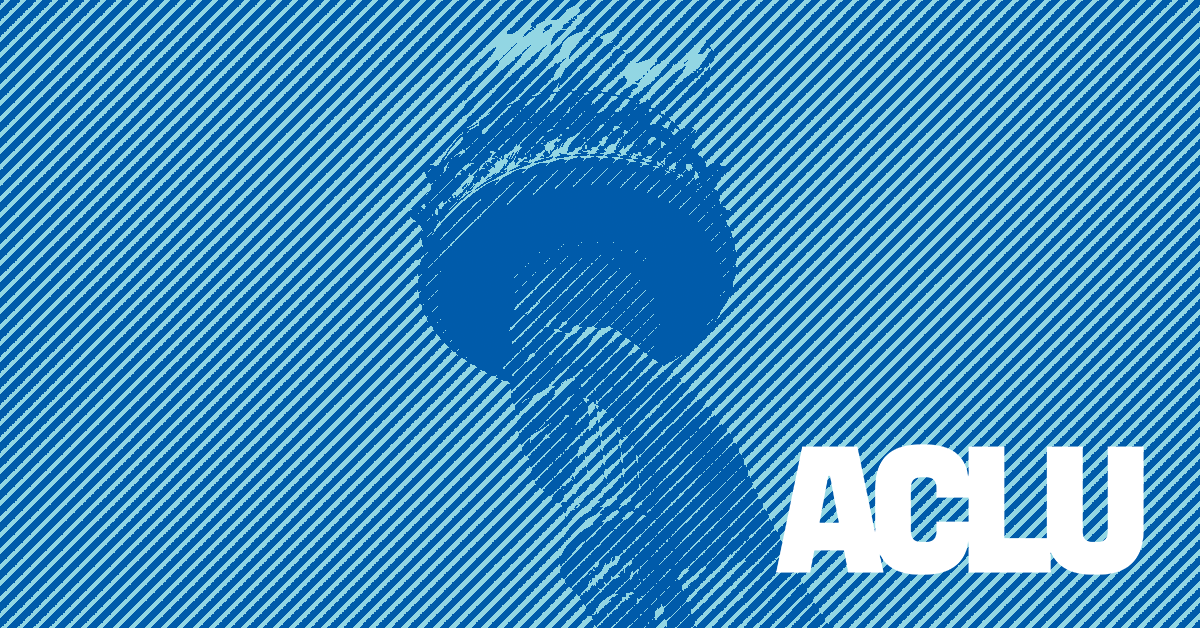OPINION: Civil Liberties Chatroom — A legal form of disobedience
Photo by the American Civil Liberties Union
Taylor Schneider is a sophomore communication studies major and the secretary of the ACLU of Ohio University.
The following article does not represent the views and opinions of the ACLU of Ohio University, the ACLU of Ohio or the ACLU. This is a submitted column. Please note that these views and opinions do not reflect those of The New Political.
In 1963, Martin Luther King proposed that morality requires unjust law not to be obeyed. Amid a broken democracy, we can stand up and fight for our rights as human beings in the U.S. This type of disobedience can happen illegally or legally. In 1955, Rosa Parks refused to give up her seat to a white man, and this past summer, people flooded the streets at the overturning of Roe v. Wade. People push the boundaries of laws when they feel the law does not protect or represent them. Today, I write about a legal form of civil disobedience I do not believe to be well known or recognized in the media or general public.
A few weeks ago, my professor, Dr. Roger Aden, shared an article written by Paul Butler in 2000 called "Racially Based Jury Nullification: Black Power in the Criminal Justice System." Butler writes about the power of standing up for your definition of justice amid a system that perpetuates racial injustice. Butler later explains that Black people do not benefit from U.S. democracy like white people. Therefore, it is more than reasonable for them to display civil disobedience and fight back against a system that disproportionately hurts them.
Jury nullification is when a jury, despite believing the defendant is guilty of a charge, acquits the defendant. When I first heard about this concept, I was unsure but Butler explains, “it is difficult to see the picture when you are inside the frame.” Although certain injustices may seem insignificant now, we will eventually understand why they matter in the long run. Thus, jury nullification may sound like an intense phenomenon but bear with me on its functionality.
Because criminal jury verdicts need to be unanimous, most racially based jury nullification occurs when at least one juror is Black. In our current justice system, this is not always likely. Voir dire is a process in which attorneys are allowed to dismiss jurors they believe won't benefit their case. Although this process is supposed to be just and equitable, prosecutors are not always held accountable for their racially-based dismissals. The landmark U.S. Supreme Court case Batson v Kentucky (1986) prohibits the dismissal of jurors based on race. Despite this, Black jurors are dismissed at twice the rate of white jurors, according to Jones. These statistics further prove the need for jury nullification. Voir dire is just another gap in the system where Black voices fall through the cracks. By illuminating these voices through nullification, Black jurors can show what justice means to them and have a say in the interpretation of the law that governs them.
Butler’s thesis is that “the Black community is better off when some nonviolent lawbreakers remain in the community rather than go to prison.” Essentially, there is justice in the act of not convicting non-violent offenders. We should not expect Black jurors to be “a passive symbol of support for a system she has no respect for.”
It is not a white jury’s job to decide if or what punishment a Black defendant gets. Especially when they have neither the context into the life of a Black American, nor face the repercussions of that sentence to the Black community. Black jurors have the right to decide what kind of punishment should be imposed, based on the impact the decision will have on their community.
Butler's idea sounds reasonable when we consider the inequities already embedded in our system. While researching communication in jury deliberation, I got frustrated when authors would provide alarming statistics about underrepresented persons in the justice system, yet fail to provide any solution.
Ironically, I do not have the answers to the systemic problems embedded in our justice system. As a white voice, I do not feel it is my place to decide or propose ideas that may not reflect the majority of the Black community. I do, however, believe Paul Butler's advocacy of jury nullification may be a good place to start. I encourage you to have conversations with your peers and professors here at Ohio University about the problems and gaps you see in our justice system. Just because we can't have a perfect system does not mean we should stop reforming to create a better system.

